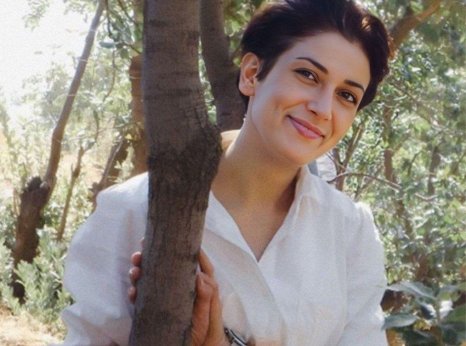Iran: Kurdish Woman Activist Sentenced To Death

On 4 August 2023, agents from the Ministry of Intelligence arbitrary arrested Pakhshan Azizi at her family home in Tehran along with several relatives, including Aziz Azizi, her father, and Pashang Azizi, her sister, and transferred them to Evin prison. Pakhshan Azizi’s family members were released from prison on bail about two weeks later. They were subsequently tried in the same case as Pakhshan Azizi before Branch 26 of the Revolutionary Court, and sentenced to between one year and two years’ imprisonment on national security and other charges that include “aiding a criminal to evade trial and conviction” in apparent reference to Pakhshan Azizi. In late September 2024, their convictions and sentences were upheld on appeal.
In an interview with Iranian media on 24 July 2024 after the verdict was issued against Pakhshan Azizi, one of her lawyers reiterated that “not only has Ms [Pakhshan] Azizi never taken up armed operations, but … from 1394 [2015/2016 on Georgian calendar] in effect because of the crimes of Da’esh [Islamic State (IS) armed group], she went to the area of Rojava [north-east] Syria, and due to being a social worker, she helped refugees and victims [of IS].” In the same interview, her lawyer also stated that “Even in the verdict itself, there is also no reference to any armed operations or armed confrontation involving Ms [Pakhshan] Azizi with any Iranian governmental or non-governmental entity.”
Since her arbitrary detention, Pakhshan Azizi went on several hunger strikes, including one in May 2024, to protest against the authorities’ transfer of Kurdish activist Verisheh (Wrisha) Moradi from the women’s ward of Evin prison to section 209. She ended her hunger strike when Verisheh (Wrisha) Moradi was transferred back to the women’s ward. In reprisal for Pakhshan Azizi’s ongoing human rights activism from prison, authorities have opened two new cases against her and denied her family contact. In mid-August 2024, according to an informed source, authorities opened a case against Pakhshan Azizi for “rioting in prison” in connection to her activism surrounding the presidential elections in Iran, which took place over two rounds between late June and early July 2024. From 6 July until mid-September 2024, authorities denied Pakhshan Azizi all contact with her family; she remains barred from in-person visits with her family. Authorities opened the second case in early September 2024 in connection to a protest Pakhshan Azizi and several others, including arbitrarily detained human rights defender Narges Mohammadi, held in the women’s ward of Evin prison against the Iranian authorities’ intensified use of the death penalty.
In the aftermath of the “Woman Life Freedom” uprising, Iranian authorities have intensified their use of the death penalty to instil fear among the population and tighten their grip on power. This escalation includes the use of the death penalty against oppressed ethnic minorities, including Baluchis and Kurds. On 29 January 2024, Iranian authorities arbitrarily executed Kurdish dissidents Pejman Fatehi, Vafa Azarbar, Mohammad (Hazhir) Faramarzi and Mohsen Mazloum, who were sentenced to death after a grossly unfair trial in late 2023. The authorities had subjected the four men to enforced disappearance since their arrests on 20 July 2022, and harassed and intimidated their families. The authorities have also intensified their use of the death penalty against women detained on political-motivated charges. In June 2024, a Revolutionary Court in Gilan province convicted human rights defender Sharifeh Mohammadi of “armed rebellion against the state” (baghi) and sentenced her to death solely due to her peaceful human rights activism. At least one other woman, Verisheh (Wrisha) Moradi, was also tried for “armed rebellion against the state” (baghi) a separate case. In 2023, authorities carried out at least 853 executions, and the use of the death penalty has disproportionately impacted Iran’s persecuted Baluchi ethnic minority, who constitute about 5% of Iran’s population, yet accounted for 20% of all executions in 2023. In 2024, the Iranian authorities have continued executions, including of ethnic minorities and dissidents.
Ethnic minorities in Iran, including Kurds, face widespread discrimination, curtailing their access to education, employment, adequate housing and political office. Continued underinvestment in regions populated by ethnic minorities exacerbates poverty and marginalization. In 2023, security forces unlawfully killed with impunity dozens of unarmed Kurdish cross-border couriers (kulbars) between the Kurdistan regions of Iran and Iraq. Amnesty International has also repeatedly documented how the Iranian authorities target individuals from Iran’s Kurdish ethnic minority for arbitrary arrest and detention based on their real or perceived support for or association with Kurdish parties, and do not provide sufficient evidence of their direct or indirect involvement in internationally recognizable offences.